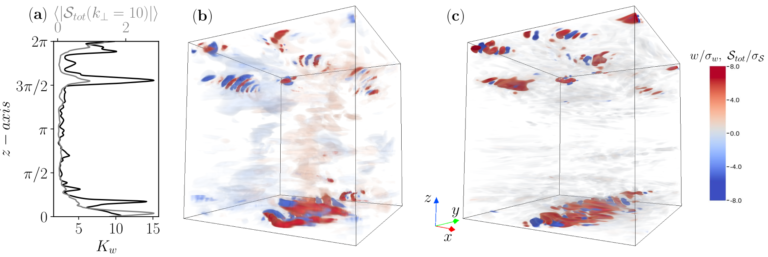Raffaello Foldes PhD thesis defense: Local Energy Transfer in Geophysical Fluids and Space Plasmas
Committee
– LEVEQUE Emmanuel, Research Director (CNRS, Emeritus) – Thesis Supervisor
– MARINO Raffaele, Research Director (CNRS) Thesis Supervisor
– PIETROPAOLO Ermanno, Professor (University of L’Aquila, Italy) – Thesis Supervisor
– BERRILLI Francesco, Full Professor (University of Rome – Tor Vergata, Italy) – Committee President
– LANOTTE Alessandra, Researcher (CNR/Nanotex, Italy) – Examiner
– LEHNER Thierry, Researcher (Observatory of Paris, France) – Examiner
Summary
Turbulence in geophysical fluids and space plasmas compete with internal waves in transferring the energy across scales. Evidences point to the possibility that an upscale energy transfer, resembling the case of two-dimensional turbulent flows, may develop in the atmosphere and in the oceans, under the effect of rotation, perhaps helped by the large aspect ratio of the domain. Indeed, bi-directional energy transfers (to large and small scales) have been observed in different natural contexts, in the oceans, for instance, but also in kinetic plasmas, in which magnetic fields support the propagation of waves, and magnetic reconnection contributes to make the dynamics of these flows even richer. In these frameworks, characterized by strong non-homogeneity and anisotropy, standard analysis tools can only provide partial information on how energy is distributed over the various scales. In order to achieve a more exhaustive characterization of the energy transfer, in this thesis we employed the so-called space-filtering (SF) technique to investigate the energetics of stratified turbulent flows of geophysical interest, and of plasmas in the kinetic regime, the latter being relevant to understand the dynamics of the interplanetary medium. In particular, we targeted two major phenomena, the extreme vertical drafts developing in the stratified geophysical flows, and the reconnection events observed in heliospheric and magnetospheric plasmas, always using simulation data. After further refining the SF technique, we used it to analyze a set of direct numerical simulations of stratified flows, varying the Froude number, focusing on the feedback of developing extreme vertical drafts on the energy transfer, locally in the physical and the Fourier space. We were able to verify that vertical drafts do actually inject energy, ultimately enhancing turbulence and dissipation, affecting the mixing properties of geophysical flows. The same approach was finally implemented on the outputs of hybrid-kinetic plasma simulations to asses the effects of magnetic reconnection events on the energy transfer at the sub-ion scales. Our analysis emphasized for the first time the role of reconnection as a trigger for dual energy transfers, simultaneously towards scales larger and smaller than the scales associated to the observed reconnection events.
Keywords: turbulence, waves, stratification, intermittency, geophysical flows, space plasmas, space-filtering

